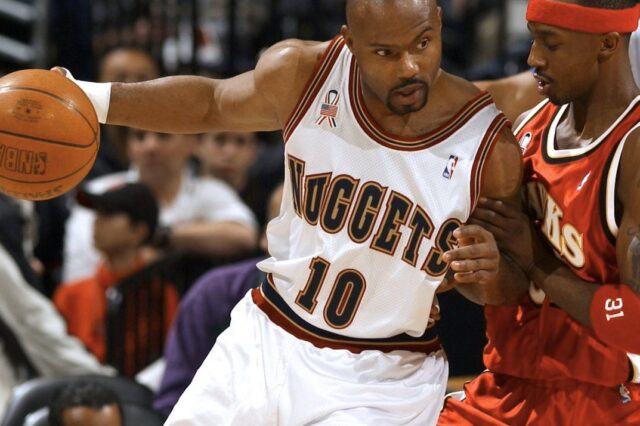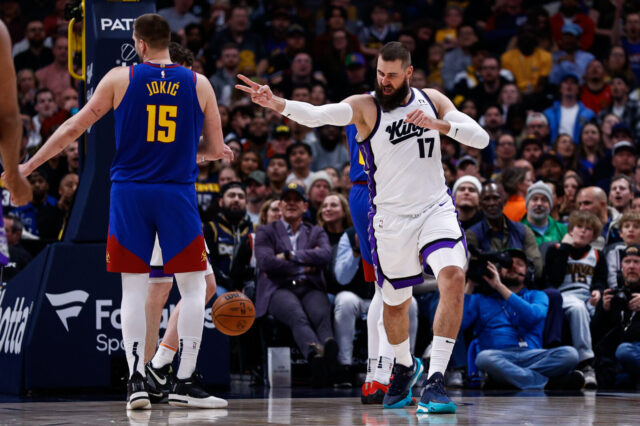It was one of the most impressive moments of Jamal Murray’s career.
No, not on the court. Murray has plenty of those moments. This time, it was off the court during an interview with the local media on a Zoom call last Friday afternoon. initially, the call started like every other interview should, with media members taking turns asking Murray questions about the NBA finally returning and the protests happening around the world. Murray was open and honest about his experience with police, sharing a couple of situations when he was racially profiled at a younger age, even with his father (Roger Murray) with him on both occasions.
But then, Murray did something unexpected and unprompted. After his interview concluded, Murray wanted to ask the media to share some of their personal experiences with racism over the years. He sat there and listened quietly to everyone’s stories before thanking the media and departing. It was one of the most impressive things I’ve ever seen him do before.
The idea of true leadership is ambiguous and can take a variety of forms. There’s the standard form that involves motivation of teammates, the big halftime speech, and the Type A personality. The Nuggets don’t have that guy on their roster, and it’s probably better that they don’t. There’s also leading by example, which is the standard for teams that don’t have a Type A personality on their roster. Players doing their job and filling their role without complaint is often praised for leadership status as well.
Murray currently sits between those two leadership extremes. He’ isn’t the “big speech” leader, but he isn’t quiet either. As a 23-year-old attempting to find his voice in the locker room as one of Denver’s young stars, he still has some way to go.
For me, this media conversation went a long way in discovering what kind of leader Jamal Murray is. He was comfortable, he was open, and he was candid when discussing some pretty difficult topics, like racism that he still sees today. Being willing to put himself out there in that regard is a new aspect of Murray we haven’t seen extensively, and it likely comes with getting older and growing into his role.
This content is no longer available.
The Nuggets were hoping for some of this development from him off the court, because when he gets back on the court, developing his game is straightforward compared to navigating leadership dynamics.
It doesn’t take a long time to find “Jamal Murray is overrated” takes around the internet. Social media, message boards, and even major outlets have dabbled in the take ever since Murray signed his five-year max contract extension last offseason. This comes on the heels of Murray becoming the third player in NBA history to average 20+ points per game in greater than 500 playoff minutes at Age 21 or younger, joining LeBron James and Kobe Bryant. Very few players had the overall scoring success that Murray had at such a young age, and those that did, even with a smaller sample size, have generally panned out well.
But it’s what Murray continues to do that will determine how great he can be. LeBron and Kobe weren’t finished products at 21 years old, and Murray certainly isn’t done developing now.
There are aspects to his game that require more attention to become a legitimate star. Taking and making more three-pointers feels like the best place to start. Among the 64 qualified guards on Basketball Reference to start at least 30 games, Murray’s 5.5 three-pointers attempted per game ranks 30th out of 64. The list of players to attempt more threes appears more like a laundry list of elite guards in today’s NBA: James Harden, Damian Lillard, Trae Young, Luka Doncic, Kemba Walker, Bradley Beal, Kyle Lowry, Donovan Mitchell, Jrue Holiday, and Devin Booker. Stephen Curry isn’t on there due to missed games. Ben Simmons and DeMar DeRozan don’t have perimeter jumpers. That’s basically every star guard with the exceptions of Chris Paul and Russell Westbrook.
We have seen Murray dabble in letting it fly before, but in this case, taking the hero shot when it counts means you have to become accustomed to it. Trae Young and Damian Lillard have taken this to another level, but spacing the floor vertically will help Murray over time and help the rest of Denver’s offense almost immediately.
Some of the three’s Trae Young attempts can be ridiculous, but the one above feels very replicable: setting up the defender before using a brush screen to create space about two feet behind the three-point line. Young doesn’t need a lot of space to fire up a shot, but in this case, he’s free as a bird.
Now, Young uses his pull-up jumper as a threat and basically breaks LaMarcus Aldridge’s ankles with a hesitation that feigns a three-point attempt. That pulls Aldridge away from the paint and allows John Collins a window for a lob dunk. Because Young has pulled up from three with such frequency and efficiency, the next steps of the offense open up, with Young dictating everything.
Murray has the talent to be able to do this consistently, but recent seasons have seen regression from him as a pull-up three-point shooter. Murray ranked 23rd in total pull-up threes attempted in 2019-20, but he shot 32.5% on those attempts, ranking 18th between Luka Doncic and LeBron James. Murray isn’t the passer those two are though, so his shooting percentage has to do more heavy lifting in causing teams to fear that action.
But with Jokic being the great passer that he is, Murray taking this next step to give Jokic even more space to make plays could be a major factor in elevating Denver’s offense from good to elite.
As the Nuggets look to take the next step as a franchise, there are a couple of ways they can do that. The easiest way to navigate (by far) is if Murray holds up his end of the bargain. Making more shots, even those that have a higher shot difficulty, will always be the avenue. It allows Denver to play more defensive lineups, thinking less about the cohesiveness of all five players on the floor offensively and more about whether Jokic and Murray can simply cover for that themselves. With Michael Porter Jr. eventually entering the fray, and with Will Barton and Jerami Grant possessing versatile skill sets as role players, Denver may not have to do that.
Still, the ceiling that Denver can reach with Murray as one of the players they rely upon most heavily, will be almost entirely up to Murray. Learning to alter his shot profile so he can bend defenses to his will is a great place to start. Becoming a better passer would help (i.e. hitting some of those high level reads and cross-court passes consistently would be huge). Improving even more as a defender (after his tangible improvements already) would contribute too.
But becoming a better leader and more comfortable with who he is may be the first step down that path. For a long time, the Nuggets have run an egalitarian system around Jokic with Murray slowly absorbing more opportunities. When he reaches the threshold where he’s attempting the number of shots a star should attempt (around 17 FGAs/game) then he will be in star territory.
He’s not that far away. All it will take is a push in the right direction, or maybe just one more playoff series to show the world what he’s made of.


